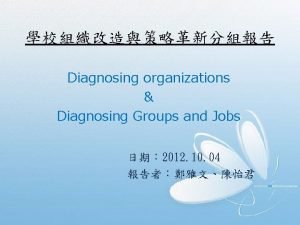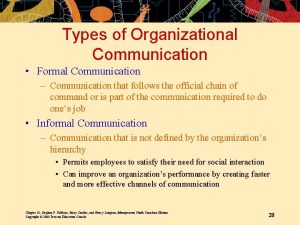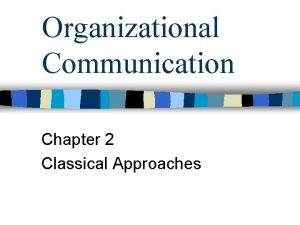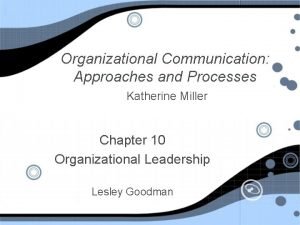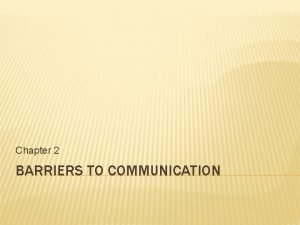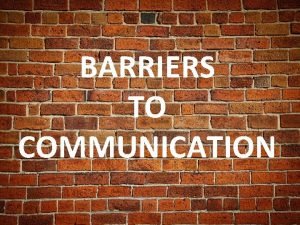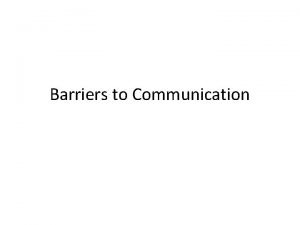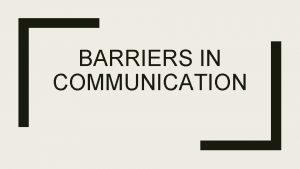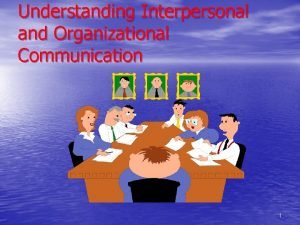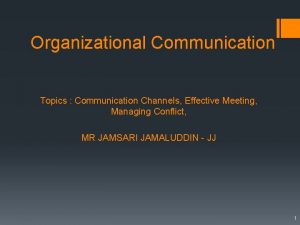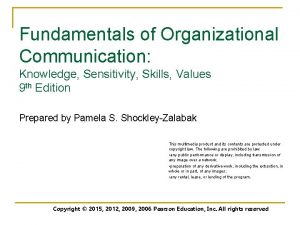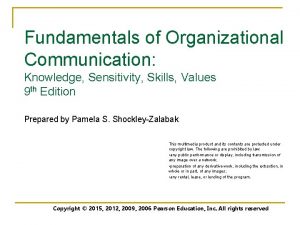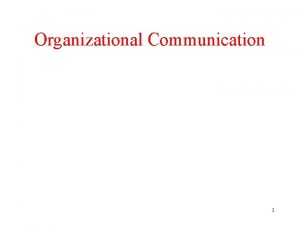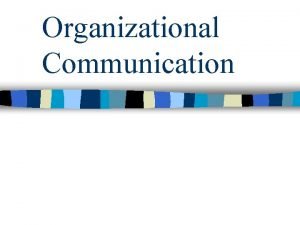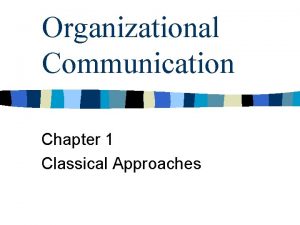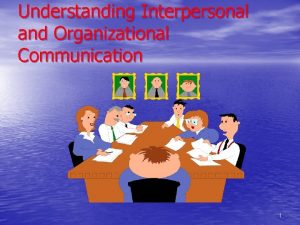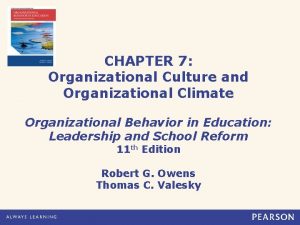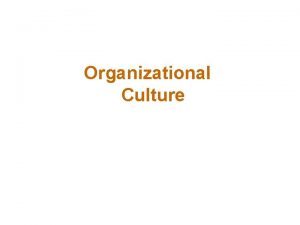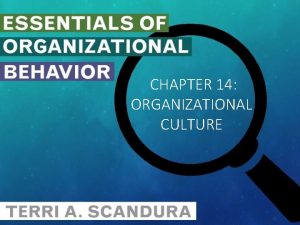CHARACTERISTICS OF ORGANIZATIONAL COMMUNICATION CHARACTERISTICS 1 Management systems












- Slides: 12

CHARACTERISTICS OF ORGANIZATIONAL COMMUNICATION

CHARACTERISTICS: � 1. Management systems � 2. Climate and organizational culture � 3. Communication network � 4. Decision making � 5. Conflict, Power and Politics � 6. Leaderships � 7. Organizational communication ethics � 8. Information and Communication Technology (ICT) in Organizational

1. Management system � Management system affects communication formed within the organization � Management approaches: system divided into three ◦ i) Classic = Formal communication ◦ ii) Human relations = Non formal communication ◦ iii) human resources = Formal communication + non formal communication � Sometimes, organization will incorporate all three management system approaches to becomes more effectives

2. Climate and organizational culture � � � Climate and organizational culture affect direct organizational communication Climate is a response to the values that exist within the organization Organizational climate affects the behavior of its members based on the achievements that are highlighted throughout being in the organization The organizational climate is constantly changing due to the influence and role of organizational citizens Eg: Most employee wil get salary every month on 23 rd. Every worker will be cheerful and various plans will be arranged on that day. If the employer instructs employees to overtime on that day, it will cause employees to be unhappy because they have plans to shopping with family. So the cheerful climate at the begining replaced with climate that does not support

2. Climate and organizational culture � � � Culture refers to the basic assumptions shared by the group members during problem solving Culture is also influenced by external influences and internal influences of the organization Culture is a value, norm and practice that has long been established and firmly in the organization Eg: Every year company A doing a family day at oversea. When it is proposed that the family day this year will be held in the country, there will be workers in the organization who protested because family day at oversea have become a tradition. As conclusion, culture is something of practices or beliefs that have been firmly held at every employee in organization.

3. Communication network � It refers to the social structure created through communication between individuals and groups within the organization � There are certain roles played by organizational citizens such as click members, isolated members, bridges, connectors, facilitators and opinion leaders � This role will be formed through several directions of information such as downward communication, upward communication, cross communication and grapevine

4. Decision making � Decision making is a decision-making process from various alternatives (Greenberg & Baron, 2000) � There are three elements that limit the communication process when decisions are made in the organization, namely the relationships in the group, hierarchical structures and political considerations � The best results often involve from all members of the organization or all members of the team rather than making decision independently/individually

5. Conflict, Power and Politics � Elements of conflict, power and politics within the organization must be occurs � The role of communication is important to manage these three elements � Effective communication enables conflicts to be overcome, power is used appropriately and organizational politics can be avoided � If all three elements are not used positively, the organizational conditions will become unstable

6. Leaderships � � � Leaders is the main role in the organization Leadership is an act or role played by a leader in helping members of the organization succeed (Cragan & Wright, 1999) Effective leadership refer to leadership qualities highlighted by a leader and a communication that is formed The preferred leader is a visionary leader, knows how to give the right work instructions, understands the subordinates and is easily approachable Without leaders, it is difficult for an organization to be productively controlled

7. Organizational communication ethics � Organizational communication ethics refers to the organization's good or bad actions in performing its moral and duty obligations � Ethical communication is a prerequisite for the effectiveness of communication and has several approaches: ◦ Helping in making choices ◦ Planning the growth and development of individuals and organizations ◦ Evaluating individuals from aspects of self-value systems, organizational value systems and professionalism standards (Muhd Mansur, 1998)

8. Information and Communication Technology (ICT) in Organizational � � � Each organization uses ICT to facilitate and accelerate work within the organization Technology is a design for an action aimed at reducing uncertainty in the context of cause and effect to achieve the stated goals (Rogers, 1995) ICT is a combination of computer technology, telecommunication technology and media (Bradley, 1998) ICT is capable for increasing productivity and strengthening an organization if it is used positively ICT often used in the organization is internet, teleconference, teletext, fax, Management Information System (MIS), email and etc.

8. Information and Communication Technology (ICT) in Organizational � Advantages use ICT in organization: - ◦ More information can processed, stored, transmitted and filtered quickly. Cost also effectively ◦ Organizations get information from a variety sources across the country without time boundaries ◦ Interaction between workers becomes easier and often ◦ Enhance the competitiveness of every organization and workers
 Characteristics of organizational communication
Characteristics of organizational communication Group level diagnostic model
Group level diagnostic model Informal channels of communication
Informal channels of communication Taylor theory
Taylor theory Katherine miller organizational communication
Katherine miller organizational communication What are intrapersonal communication barriers
What are intrapersonal communication barriers Strategies to overcome communication barriers
Strategies to overcome communication barriers What are the organizational barriers to communication
What are the organizational barriers to communication Barriers of communication
Barriers of communication Interpersonal and organizational communication
Interpersonal and organizational communication Organizational communication topics
Organizational communication topics Fundamentals of organizational communication
Fundamentals of organizational communication Fundamentals of organizational communication 9th edition
Fundamentals of organizational communication 9th edition

